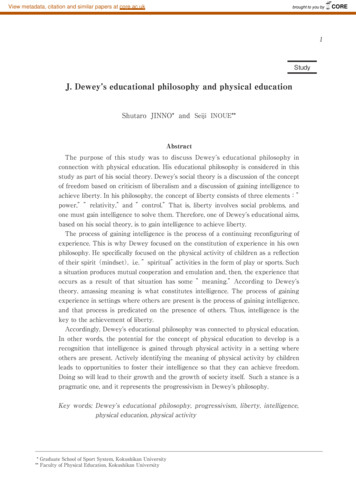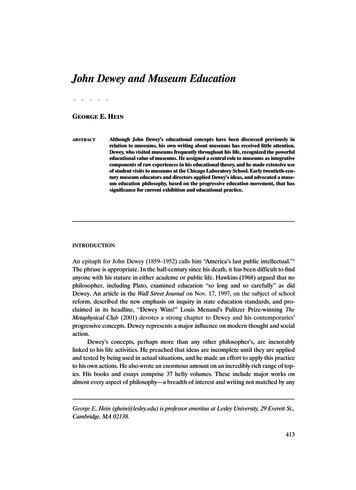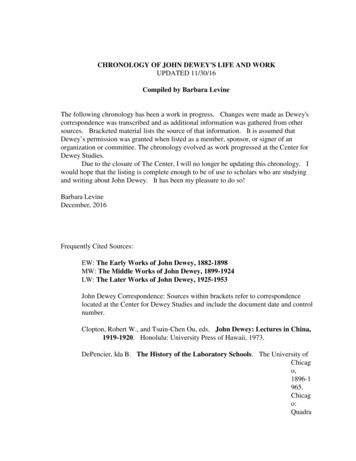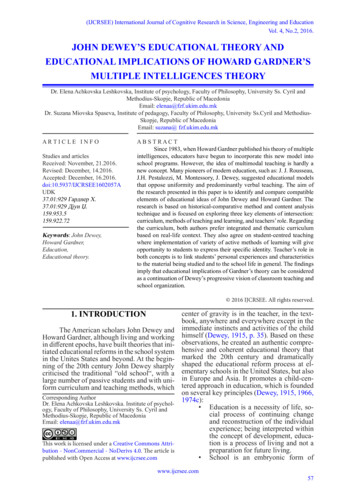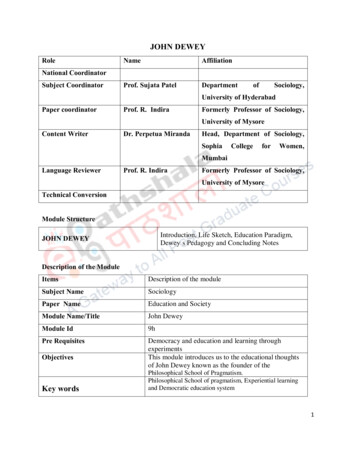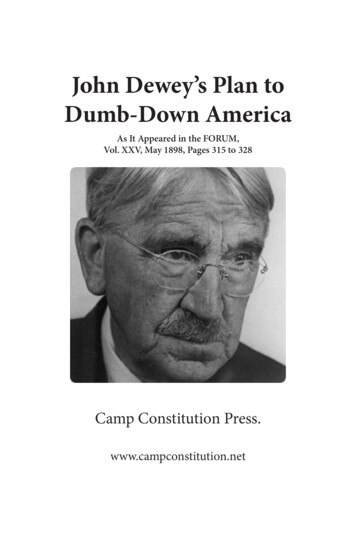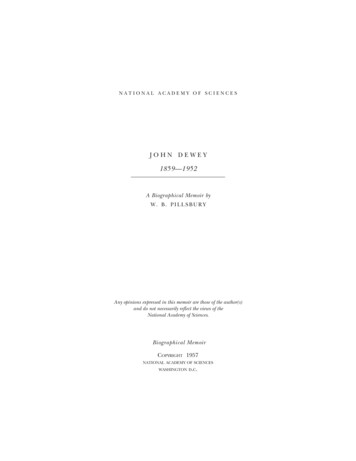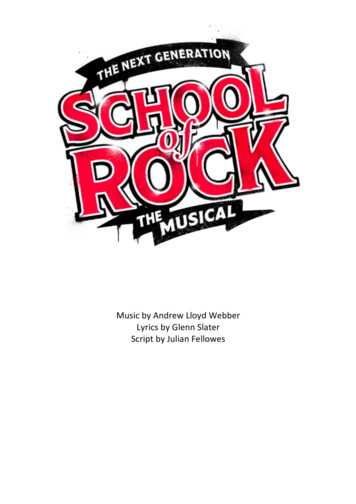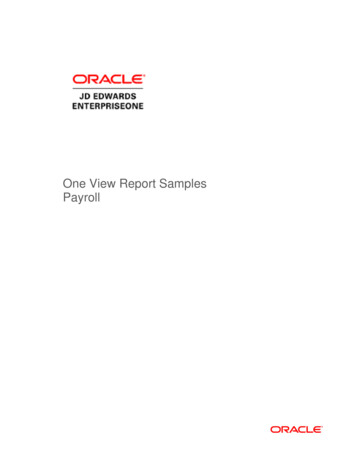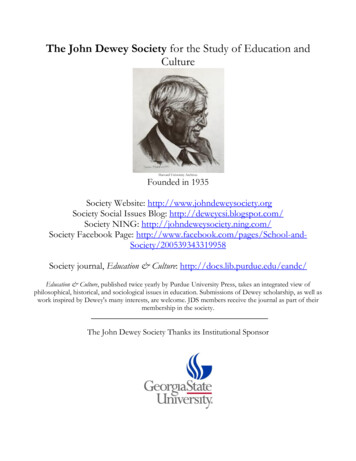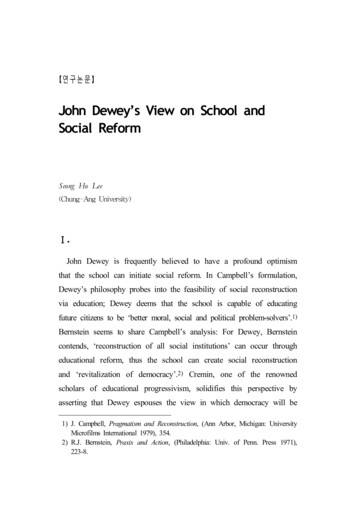
Transcription
【연 구 논 문 】John Dewey’s View on School andSocial ReformSeong Ho Lee(Chung-Ang University)Ⅰ.John Dewey is frequently believed to have a profound optimismthat the school can initiate social reform. In Campbell’s formulation,Dewey’s philosophy probes into the feasibility of social reconstructionvia education; Dewey deems that the school is capable of educatingfuture citizens to be ‘better moral, social and political problem-solvers’.1)Bernstein seems to share Campbell’s analysis: For Dewey, Bernsteincontends, ‘reconstruction of all social institutions’ can occur througheducational reform, thus the school can create social reconstructionand ‘revitalization of democracy’.2) Cremin, one of the renownedscholars of educational progressivism, solidifies this perspective byasserting that Dewey espouses the view in which democracy will be1) J. Campbell, Pragmatism and Reconstruction, (Ann Arbor, Michigan: UniversityMicrofilms International 1979), 354.2) R.J. Bernstein, Praxis and Action, (Philadelphia: Univ. of Penn. Press 1971),223-8.
124Seong Ho Leeaccomplished through the reformed schooling.3)In many of his works, Dewey constantly underscores theimportance of the school as the social center through which socialprogress is attained, as shall be seen later. Hence, it is not unusualfor him to be criticized as ‘overly optimistic’ or even ‘naive’ aboutthe school’s contribution to improving society.4) However, we cannotice that Dewey’s position with respect to this matter begins toalter around the Great Depression. In one of his writings in 1934, hemakes it explicit that the school cannot be a creator of ‘a new socialorder’.5) Westbrook, who is an outstanding contemporary figureinvestigating the entire span of Dewey’s intellectual life both in scopeand depth, briefly mentions this change in terms of ‘a subtantialdisplacement of the classroom from the center of [Dewey’s] reformvision’.6) In short, Dewey’s optimism fades after the Depression.In this paper, I will make an attempt to illuminate why and howDewey’s optimism withers, which goes unobserved by numerous studiesof Dewey. In doing this, I will examine Dewey’s view of socialreconstruction via schools, his recognition of the main hindrances todemocracy that cause his fading optimism, his search for solutions,and his final thoughts upon the role of schools. Before I proceed, itis worth noting that since Dewey’s works quoted here, with a few3) L.A. Cremin, The Transformation of the School, (N.Y.: Vintage Books 1964), 126.4) J. Campbell, Pragmatism and Reconstruction, (Ann Arbor, Michigan: UniversityMicrofilms International 1979), 366.5) J. Dewey, “Can Education Share in Social Reconstruction?” in Boydson, J.A. ed.John Dewey: The Later Works, Vol.9, (Carbondale: Southern Illinois Univ. Press1934/1986), 207.6) R.B. Westbrook, John Dewey and American Democracy. (Ithaca: Cornell Univ.Press. 1991), 508.
John Dewey’s View on School and Social Reform125exceptions, come from the reprint, I add in each citation form Deweythe year of its original publication to demonstrate that Dewey’s shiftoccurs around the Depression of 1929, as shown above.Ⅱ. Democratic Reconstruction of Society via Schools:Dewey’s OptimismUntil the end of 1920s, Dewey maintains his deep faith in theschool as a chief and primary agency of social reform. In hisformulation, the school is obliged to ‘serve the main purposes of thecommunity as a whole’.7) Furthermore, the school is a social center.In Moral Principles of Education, Dewey stresses the social aspect ofschooling by postulating that the school is an institution ‘erected bysociety’ which has the purpose of enhancing ‘the welfare of society’and providing the society with a better future; the educational systemwithout this ‘ethical responsibility’ is ‘derelict and a defaulter’.8)Namely, the school is the most important producer of social progressand improvement.By arguing this, Dewey does not insinuate the supremacy of socialpurposes of education over individual ones. Society, from hisstandpoint, does not necessarily conflict or contradict with individuals.Rather, both society and individuals are interactive and interdependent.The dichotomy between the two is just one of many kinds of7) J. Dewey, “What is a School for?” in Boydson, J.A. ed. John Dewey: TheMiddle Works, Vol.5, (Carbondale: Southern Illinois Univ. Press1923/1983), 190.8) J. Dewey, Moral Principles of Education in Boydson, J.A. ed. John Dewey: TheMiddle Works, Vol.4, (arbondale: Southern Illinois Univ. Press1909/1977), 269.
126Seong Ho Leedualism that are attacked by Dewey throughout his writings. If thesocial side is removed from the child, all that is left is mereabstraction; on the contrary, if the individual factor is eliminatedfrom the society, society is simply ‘an inert and lifeless mass’.9)Moreover, the individual is ‘subordinate’ without communication ofexperience from and to others while society is also ‘subordinate’unless it constantly facilitates the contacts among individuals.10)Extreme individualism is avoided by Dewey in that he emphasizes‘social direction’ of ‘a purely individual consciousness’ toward ‘generalor social interests’; simultaneously, extreme collectivism is alsodeclined in that he denounces a society which forces individuals’conformity to it using ‘the authority of custom and traditions’.11)At this point, it should be noted that in Dewey’s formulation, theethical responsibility of the school is by no means to serve any typeof society regardless of whether it is authoritarian, totalitarian,regimental, oppressive, etc. ‘Education as a social process and function’is not significant unless the desirable kind of society can be defined.12)Thus, Dewey conceives the term ‘society’ in two ways--de facto andde jure, i.e., descriptively and normatively; his concern resides in thelatter. Thoroughly investigating a measure for ‘the worth of anygiven mode of social life’, Dewey proffers two criteria for evaluatingsociety; the variety of shared interests, and free and full intercourse9) J. Dewey, “My Pedagogic Creed” in Boydson, J.A. ed. John Dewey: The EarlyWorks, Vol.5, (Carbondale: Southern Illinois Univ. Press1897/1976), 86.10) J. Dewey, Reconstruction in Philosophy in Boydson, J.A. ed. John Dewey: TheMiddle Works, Vol.12, (Carbondale: Southern Illinois Univ. Press1920/1982),198.11) J. Dewey, Democracy and Education, (N.Y.: MacMillan Co.1916/1952), 356-7.12) Ibid. 112.
John Dewey’s View on School and Social Reform127with other forms of associations.13)The two criteria above are the main features of a democraticsociety. For Dewey, a good society is a democratic society, anddemocracy is the direction toward which social reconstruction shouldbe oriented. The democracy in his mind is ‘wider and fuller’ than ademocratic political system.14) Dewey’s notion of democracy can beexplained in two ways. One the one hand, it is a mode ofcommunity life which is based upon common factors of society suchas shared goals and interests, and active communication among itsindividual members.15) On the other, it is a method of intelligenceused for directing social action--the modus operandi of intelligencethat is characterized to be both experimental and cooperative.16)I do not intend to go further about Dewey’s democracy, which isnot the main theme of this paper. For him, in short, social improvementvia schooling denotes that the school initiates the democraticreconstruction of society by educating its future citizens in thedistinctive characteristics of democracy mentioned above. This is howDewey envisages the school reconstructing society toward democracy.In Dewey’s view, it is not any kind of school that can producesocial improvement. Throughout the fifth and sixth chapters of hismagnum opus, Democracy and Education, Dewey repudiates a numberof erroneous conceptions of education which have prevailed, and then13) Ibid. 95-6.14) J. Dewey, The Public and its Problems in Boydson, J.A. ed. John Dewey: TheLater Works, Vol.2, (Carbondale: Southern Illinois Univ. Press1927/1984), 325.15) J. Dewey, Democracy and Education, (N.Y.: MacMillan Co.1916/1952), 100.16) J. Dewey, Liberalism and Social Action in Boydson, J.A. ed. John Dewey: TheLater Works, Vol.11, (Carbondale: Southern Illinois Univ. Press1935/1987), 56-7.
128Seong Ho Leeestablishes a new one, viz., a democratic conception of education.17)It is when the school founds itself on this democratic conception ofeducation that it becomes a main dynamo which generates thedemocratic reconstruction of society.Dewey posits ‘education as growth’: For him, a life is essentially aconstant process of growth, and the function of education is to fosterthis growth.18) In Dewey’s formulation, ‘growth’ signifies the incrementand expansion of meaningful experience of children via its incessantreconstruction and reorganization. A special type of experience Deweyis concerned with is ‘reflective’ experience, or experience involvingreflective thinking, which is experimental in nature.19) Furthermore,experience is enlarged by communication.20) Hence, Dewey’s idea of‘growth’ embraces the salient features of democracy--being experimentaland communicative.Along with the notion of education as growth, the school needs tofulfill another crucial requirement in order to initiate social progress:It should be restructured as a community. Dewey emphasizes theimportance of making the school ‘a genuine form of community life’, i.e.,‘the most natural form of cooperation and association’ in whichchildren are trained to become good members of democratic society.21)For him, the school has to be constructed as a special environmentin which ‘the factors of disposition it is wished to develop’ are17)18)19)20)21)J. Dewey, Democracy and Education, (N.Y.: MacMillan Co.1916/1952), 63-89.Ibid. 59.Ibid. 176Ibid. 6.J. Dewey, The School and Society in Boydson, J.A. ed. John Dewey: TheMiddle Works, Vol.1, (Carbondale: Southern Illinois Univ. Press 1899/1976), 10-11.
John Dewey’s View on School and Social Reform129simplified and ‘the existing social customs’ are purified.22) Moreover,the school can be ‘an embryonic society’ or ‘a miniature community’by incorporating community activities into its education, not byoffering lessons ‘having an abstract and remote reference’ to thefuture living.23)To conclude from the foregoing discussion, Dewey believes thatthe school, which is reformed in accordance with the concept ofeducation as growth and reorganized as a miniature community,becomes the primary agency of democratic reconstruction of societyby orienting children toward democratic principles and values. This isDewey’s optimism. Childs comments on this as follows:[Dewey] perceived that the responsibilities of the citizens are greater, notless, in a country in which the people rule. He worked for the creation of aschool that would prepare the young for these exacting intellectual and moralresponsibilities of democratic citizens.24)Ⅲ. Dewey’s Fading OptimismAs stated earlier, Dewey is depicted to have a ‘faith in utopianreform through education’ which is ‘a long messianic tradition inAmerican educational thought’.25) Nevertheless, Dewey’s belief that22) J. Dewey, Democracy and Education, (N.Y.: MacMillan Co.1916/1952), 27.23) J. Dewey, The School and Society in Boydson, J.A. ed. John Dewey: TheMiddle Works, Vol.1, (Carbondale: Southern Illinois Univ. Press 1899/1976), 12.24) J.L. Childs, American Pragmatism and Education, (N.Y.: Holt1956), 105.25) D. Tyack & E. Hansot, Public Schools in Hard Times, (Harvard Univ. Press1984), 24-25
130Seong Ho Leethe school can be a chief agency of social reform dwindles, Icontend, as he becomes more perceptive to the obstacles whichhinder the democratic reconstruction of society; this can be clearlynoticed in most of his writings after 1930s. For instance, the ideathat the school can be a ‘main agency’ in creating ‘a new socialorder’, Dewey confesses, is ‘unrealistic’. He goes further by stating“Any such view ignores the constant operation of powerful forcesoutside the school which shape mind and character.”26)According to him, therefore, we should comprehend the fact thatthe school is merely one of many agencies in ‘forming character’;compared with other agencies, its influence is ‘neither constant norintense’.27) Hence, Dewey’s view of the school as a social center andhis vision of democratic reconstruction via schooling, expressed inThe School and Society(1899) and Democracy and Education(1916) intheir fullest scope and depth, are hardly stressed any more.If we are to understand this change in Dewey more accurately, weneed to begin with his disappointment with schools as reformingagencies first: He deplores that the school has failed ‘notably andlamentably’ in its important function ‘to equip individuals to see themoral defects of existing social arrangements and to take an activeconcern in bettering conditions’.28) Dewey expounds his frustration asfollows:26) J. Dewey, “Education and Social Change” in Boydson, J.A. ed. John Dewey: TheLater Works, Vol.11, (Carbondale: Southern Illinois Univ. Press 1937/1987), 414.27) J. Dewey, “Education and Social Order” in Boydson, J.A. ed. John Dewey: TheLater Works, Vol.9, (Carbondale: Southern Illinois Univ. Press 1934/1986), 187.28) J. Dewey, J. (1932/1985) Ethics in Boydson, J.A. ed. John Dewey: The LaterWorks, Vol.7, Carbondale: Southern Illinois Univ. Press 1932/1985: 123.
John Dewey’s View on School and Social Reform131Education was presented as a process of transmission and reconstructionof culture. . The need for enabling individuals to take part in the task of aconstantly changing society was put in the foreground of educationalphilosophy. The idea that the school should be . a form of community life,and that this principle should be applied in discipline, instruction and theconduct of recitation . gained appreciable . recognition. This change in theunderlying concepts of education gave promise of a type of educationalphilosophy . . It contained within the itself the seed of efforts to bringabout a definite integration of activities within the school with the activitiesgoing on in the larger community beyond the school walls. The promise hasnot been realized in any substantial degree.29)Then, why has the school failed and why has ‘the promise’ beenbroken? In Dewey’s analysis, the school has failed partly because of‘the lag in school practice due to inertia’, but mainly because of ‘theinfluential forces’ of business and industry which are ‘directlyantagonistic to the social ideas professed in educational philosophy’.30)Differently put, as Dewey witnesses assiduous expansion of antidemocratic forces of the currently dominant economic system, viz.,capitalism, he comes to realize that the school alone cannot be achief producer of democratic reconstruction of society. Thus, hisoptimism withers away.29) J. Dewey, (1933/1986) a, “The Social-Economic Situation and Education” inBoydson, J.A. ed. John Dewey: The Later Works, Vol.8, Carbondale: SouthernIllinois Univ. Press1933/1986 a: 43-4. emphasis added.30) Ibid. 46.
132Seong Ho LeeⅣ. Dewey’s Recognition of Obstacles to DemocracyAs hinted above, Dewey’s faith in schools becomes weakened ashe recognizes formidable obstacles to democracy, created by capitalism.Considering the fact that Dewey’s critiques of capitalism, which areharsh and severe enough for him to be warned not to be ‘too hardon capitalistic system’ by Levinson, emerge after the Depression, itwould not be too conjectural to assume that Dewey’s fading optimismhinges upon the misery and chaos resulting from the Depression.31)Shortly before the Depression, to expound, Dewey begins to beseriously concerned with the excessive greed of capitalism bydescribing it to be ‘a blind, chaotic and unplanned’ economic systemdriven by ‘business conducted for pecuniary profit’.32) As thedestructive effects of the Depression are propagated, Dewey getsmore susceptible to and critical of the influence of capitalism whichaffects all phases of life.33) His aversion to capitalism is so intensethat he becomes skeptical about the compatibility between capitalismand democracy: For him, the ‘question’ is ‘whether democracy is apossible form of society when . economic power is as concentratedas today’.34)Sydney Hook explains this in the following passage:31) G. Dykhuizen, The Life and Mind of John Dewey, (Carbondale: Southern IllinoisUniv. Press 1973), 255.32) J. Dewey, Individualism: Old and New (N.Y.: Milton Balch & Company 1930), 81-2.33) J. Dewey, Ethics in Boydson, J.A. ed. John Dewey: The Later Works, Vol.7,(Carbondale: Southern Illinois Univ. Press 1932/1984), 374.34) J. Dewey, “Social Significance of Academic Freedom” in Boydson, J.A. ed.John Dewey: The Later Works, Vol.11, (Carbondale: Southern Illinois Univ.Press 1936/1987), 378.
John Dewey’s View on School and Social Reform133For the greater part of [Dewey’s] life he was convinced by the evidencesupplied by an expanding capitalism that its basic evils could be eliminatedby traditional progressivism. In 1929, however, before the depression broke,in a series of prescient articles, Dewey made the great turn. The diagnosisof the socialists was admitted to be justified.35)Westbrook adds to this by arguing “Dewey thus arrived by themid-thirties at a thoroughgoing critique of capitalism and thetheoretical foundations of a democratic-socialistic alternative”.36)Then, why is Dewey so antagonistic toward capitalism? How doeshe conceive and criticize it? Let us attempt to answer these questionsby probing into Dewey’s view on capitalism and his conception ofits impacts upon society and education. I will start with his criticismof capitalism.1. On CapitalismMost of Dewey’s critical remarks on capitalism are fragmentaryalthough they are by no means insignificant. However, he offers avery comprehensive and structured analysis of capitalism in Part IIIof Ethics, the 1932 revised version. In this book, Dewey sees capitalismas a term referring to ‘the outstanding features of the present methodsof production and economic organization’: There are ‘two corners’ ofthe capitalist system; the private ownership and freedom of enterprise.The underlying principle which regulates these two cornerstones forthe sake of ‘general good’ is competition, or fair competition.37)35) S. Hook, John Dewey: An Intellectual Portrait, (N.Y.: The John Day Co.1939), 165.36) R.B. Westbrook, John Dewey and American Democracy. (Ithaca: Cornell Univ.Press. 1991), 438.37) J. Dewey, Ethics in Boydson, J.A. ed. John Dewey: The Later Works, Vol.7,
134Seong Ho LeeFor Dewey, in short, capitalism is a new economic system of theindustrial age--the system which is founded upon economic individualismthat motivates human activities by pecuniary profit.38) Hence, herebuts the claim that capitalism efficiently contributes to the improvementof material conditions of mankind; he believes that the improvementshould be credited to ‘invention under the guidance of science’, notto capitalism.39) According to Dewey, capitalism creates ethical ormoral problems in that it affects the welfare of people.40) At thispoint, it is not my intention to examine all of the problems causedby capitalism that are mentioned in Ethics. Rather, I will concentrateon some major ones which I deem to be the most relevant to this paper.First, capitalism brings about a new division of society betweenthe working class and the white-collar class; the latter includes that‘high executives’ and ‘principal owners of modern industry’. As themanagement system of gigantic factories for mass production becomesmore sophisticated, the workers get separated farther from their employersand managers; the relationship between them turns impersonal. Thisis a new class division for Dewey, which replaces ‘the old-timedivisions into landlord and tenant, or gentry and common-folk’.41)Second and more importantly, capitalism deepens and exacerbatesthe above rift through unequal distribution of wealth. In Dewey’sanalysis, capitalism creates the concentration of wealth in a small(Carbondale: Southern Illinois Univ. Press 1932/1985), 375-7.38) J. Dewey, Individualism: Old and New 1930 (N.Y.: Milton Balch & Company1930), 89-90.39) J. Dewey, Ethics in Boydson, J.A. ed. John Dewey: The Later Works, Vol.7,(Carbondale: Southern Illinois Univ. Press 1932/1985), 404.40) Ibid. 377.41) Ibid. 380.
John Dewey’s View on School and Social Reform135segment of the white-collar class whereas it causes the marginalizationand pauperization of the working class.42)Third, related to the preceding two points, Dewey notices thatcapitalism not merely produces and accelerates the class partitionbased on the discrepancy of material conditions between the twoclasses, but also creates and aggravates the conflict of interestsbetween them. And thus, it ruptures the community life of society.43)Next, the capitalist economic system jeopardizes the security ofpeople by causing unemployment. According to Dewey, ‘panics anddepressions’ in the economy, which are primarily responsible forunemployment, are mostly the consequences of ‘the single-mindedpursuit of profit, combined with lack of any far-reaching plans forstabilizing industry’.44) Under capitalism, to put it another way,unemployment is not accidental, but unavoidable; it is a ‘confessionof the breakdown of unregulated individualistic industry conducted forprivate profit’.45)From the preceding discussion, it is interesting to see that inDewey’s critiques of capitalism, its main defect resides in theunrestricted pursuit of profit, not its system of private property. Toborrow Tyack’s explanation, Dewey is ‘more concerned with theantisocial effects of the profit motive of character--its miseducativequality-than with the dynamics of capital accumulation’.46) Despite42)43)44)45)Ibid. 408.Ibid. 383.Ibid. 382.J. Dewey, Individualism: Old and New 1930 (N.Y.: Milton Balch & Company1930),112-3.46) D. Tyack & E. Hansot, Public Schools in Hard Times, (Harvard Univ. Press1984), 25-6.
136Seong Ho Leethe similarity between Dewey and Marx with regard to their antagonismtoward capitalism, this is one of Dewey’s diverging points from Marx,which would be worth further investigation through some future works.Then what are ‘the antisocial effects’ and ‘miseducative quality’ ofcapitalism conceived by Dewey?2. Impacts of Capitalism on Society and EducationAfter he systematically criticizes capitalism, Dewey moves on toexamine how it affects both individuals and society. In his view,first, capitalism creates the monopoly of political influence by ‘thefew who have economic power’, and thus becomes ‘fatal to the realizationof liberty for all as it is fatal to the realization of equality’.47) Inshort, the capitalist system violates the ideals of democratic society,which incapacitates the school to lead social reform by making itsdemocratization extremely difficult.Second, Dewey contends that the inequality caused by capitalism isnot only eco-political, but also intellectual and cultural since it falselyassumes and rationalizes individual difference with respect toendowed intelligence in order to vindicate unequal distribution ofpower and wealth.48) For him, this is the rejection of the belief inintellectual potentialities of all individuals, which is totally undemocratic.Third, the capitalist system endeavors to maintain its status quo byever being reactionary to social change: Its beneficiaries resist ‘everyeffort at planned control of economic forces’ by preserving their47) J. Dewey, “Liberalism and Equality” in Boydson, J.A. ed. John Dewey: TheLater Works, Vol.11, (Carbondale: Southern Illinois Univ. Press1936/1987), 370.48) J. Dewey, Liberalism and Social Action in Boydson, J.A. ed. John Dewey: TheLater Works, Vol.11, (Carbondale: Southern Illinois Univ. Press1935/1987), 38-9.
John Dewey’s View on School and Social Reform137‘privileges and legal rights they already possess’.49) Dewey continues:When the school faces the choice between the status quo and change,it takes the former ‘unconsciously by accommodation to theexigencies of immediate pressure and of estimate of probability ofsuccess in carrying out egoistic ambitions’.50) Here, it is worth notingthat despite his dissatisfaction with existing schools, Dewey implicitlydenies the reproduction theory, i.e., a Marxian view of schooling, asshall be discussed later in this paper.Fourth, the economic individualism, which is the most dominantfeature of the capitalist system, distorts the wholeness of humanbeings, and destroys the cooperative mode of society by ignoring thesocial aspect of human actions and by encouraging excessive competitionthat results in conflicts among individuals; hence, the economicindividualism disintegrates the socialness of human nature by inducing‘apathy and incapacity of thought in collective matters’.51) Thus whenthe school is subordinated to economic individualism, its role as acommunity is degraded; it merely becomes an arena for competitionamong egoistic individuals striving for their material success. Putanother way, the influence of economic individualism on the schoolincreases ‘by the part that accumulation and acquisition’ play in theAmerican life. And “the schools set out to have pupils accumulate49) J. Dewey, “Liberty and Social Control” in Boydson, J.A. ed. John Dewey: TheLater Works, Vol.11, (Carbondale: Southern Illinois Univ. Press1935/1987), 360.50) J. Dewey, “Can Education Share in Social Reconstruction?” in Boydson, J.A.ed. John Dewey: The Later Works, Vol.9, (Carbondale: Southern Illinois Univ.Press 1934/1987), 207.51) J. Dewey, “The Social-Economic Situation and Education” in Boydson, J.A. ed.John Dewey: The Later Works, Vol.8, (Carbondale: Southern Illinois Univ. Press1933/1986), 63.
138Seong Ho Leeproperty and material goods”.52)Finally, Dewey points out that capitalism limits and degenerateshuman actions by locating the entire emphasis upon material gains.Namely, ‘emphasis upon acquisition’ under capitalism ‘has exaggeratedthe significance of business and money, materialistic in comparisonwith cultural aims and values’. Thus, ‘it is constantly repeated, andfinally generally believed, that most men would not engage inproductive effort unless driven by hope of personal gain or thepressure of imminent loss or disaster’.53) In the capitalist system,activities of human beings are considered to be simply economic inscope, and the role of intelligence is degraded into an instrument forpecuniary interest.From the preceding analysis, Dewey concludes that as long ascapitalism is a dominant social force, there is ‘a growing pessimismabout the possibility and the value of democracy not only as a formof government but as a principle of social relations and organization’.54)In his view, the prevailing impacts of capitalism hinder the democratizationof both schools and society. Under these circumstances, the school isno longer a ‘primary agency’ of social reform. Thus, Dewey’s optimismdwindles, and he seeks some measures by which we can remove, orat least mitigate the evils of capitalism described previously.52) J. Dewey, “Anniversary Address” in Boydson, J.A. ed. John Dewey: The LaterWorks, Vol.11, (Carbondale: Southern Illinois Univ. Press 1936/1987), 178.53) J. Dewey, “The Social-Economic Situation and Education” in Boydson, J.A. ed.John Dewey: The Later Works, Vol.8, (Carbondale: Southern Illinois Univ. Press1933/1986), 62.54) Ibid. 65.
John Dewey’s View on School and Social Reform139Ⅴ. Dewey’s AlternativesIn dealing with capitalism, Dewey urges that ‘we should throughorganized endeavor institute the socialized economy of materialsecurity and plenty that will release human energy for pursuit ofhigher values’.55) According to my understanding, Dewey means threethings by ‘socialized economy’; social control of industries andnatural resources, equal redistribution of wealth via taxation, andestablishment of a social welfare system.First, Dewey argues for ‘social control of capitalism’--‘socializationof all natural resources and natural monopolies, of ground rent, andbasic industries’.56) In other words, natural resources such as ‘mineraldeposits, water power, oil, natural gas’, infrastructure industries like‘transportation and communication’ and financial businesses should beput under public control through government action.57)Second, Dewey underlines the need for equal redistribution ofnational wealth through fair taxation. Thus, he recommends thegovernment to ‘force the wealthy owner of the nation to surrendertheir control over the lives and destinies of the overwhelming majority’and ‘to compel them to pay taxes commensurate in sacrifice, withthat of people with very small incomes’.58)55) J. Dewey, Liberalism and Social Action in Boydson, J.A. ed. John Dewey: TheLater Works, Vol.11, (Carbondale: Southern Illinois Univ. Press1935/1987), 63.56) J. Dewey, “No Half-Way House for America” in Boydson, J.A. ed. JohnDewey: The Later Works, Vol.9, (Carbondale: Southern Illinois Univ. Press1934/1986), 289-90.57) J. Dewey, “The Need for a New Party” in Boydson, J.A. ed. John Dewey: TheLater Works, Vol.6, (Carbondale: Southern Illinois Univ. Press1931/1985), 178.58) J. Dewey, “You Must Act to Get Congress to Act” in Boydson, J.A. ed. JohnDewey: The Later Works, Vol.6, (Carbondale: Southern Illinois Univ. Press
140Seong Ho LeeThird, Dewey proposes social welfare programs to aid theunemployed such as unemployment insurance, municipal housing,relief fund, etc. Since the unemployment results from the failure ofthe present economic system, the society is ‘responsible for alleviatingthe distress due to unemployment’.59) He vehemently opposes anyattempt to ‘throw responsibility upon private charity’; instead, headvises the adoption of ‘an inclusive government program’.60)Dewey emphasizes ‘political action’ in order to accomplish ‘socialized’or ‘planned
4FPOH)P-FF accomplished through the reformed schooling.3) In many of his works, Dewey constantly underscores the importance of the school as the social center through which socialAuthor: Seong Ho LeePublish Year: 2013
